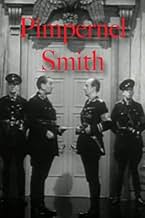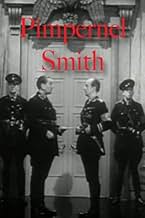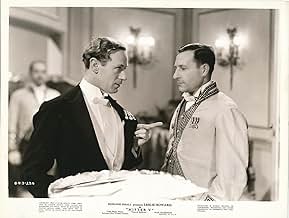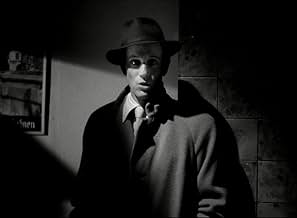Adicionar um enredo no seu idiomaProfessor Horatio Smith, while seeming very unassuming, rescues victims of Nazi persecution during World War II.Professor Horatio Smith, while seeming very unassuming, rescues victims of Nazi persecution during World War II.Professor Horatio Smith, while seeming very unassuming, rescues victims of Nazi persecution during World War II.
- Direção
- Roteiristas
- Artistas
- Prêmios
- 4 vitórias no total
- General von Graum
- (as Francis Sullivan)
- Clarence Elstead
- (as Lawrence Kitchen)
Avaliações em destaque
Howard was given a second chance to play the same character in a modern setting, as an underground agent working against the Nazis on their own soil. The script, direction, and acting are all superb. The only negative is that this film TAKEN ON ITS OWN might seem contrived and over-written. Unless - THIS IS THE KEY -- you see the original first. Remember that this was the era before 500 cable channels and streaming video. It is a 'given' that the audience for this film was familiar with the first. So if you you follow their footsteps and see the films in proper order, the sheer bravado and outrage within this script will pop, and you will enjoy a tremendously entertaining film by a master at the top of his craft.
In particular, the exchanges between Howard and his nemesis, played by Francis L. Sullivan, and are the stuff of legend.
And the scene where Howard, playing a die-hard bachelor, shows a photo of his lifelong love (the statue Aphrodite) to the character played by Mary Morris and then tears it up in front of her ... remains one of the most romantic scenes ever films. A declaration of love with no words spoken.
The pity is that being B&W this film will have a smaller and smaller audience in years to come. Pity.
((Designated "IMDb Top Reviewer." Please check out my list "167+ Nearly-Perfect Movies (with the occasional Anime or TV miniseries) you can/should see again and again (1932 to the present))
But what we loved about him most was his unswerving patriotism. His love of this country, more evident during the war years, was something he lived by and eventually was something he gave his life for and we all herald him a hero in our midst. A truly great Englishman and one we can all be proud of. To us he was the sort of Englishman we all wanted to be and to Americans he was the Englishmen on whom all others would be judged from that day forward.
In Pimpernel Smith he all but reprises his roll as The Scarlett Pimpernel from the 1934 film of the same name. This time the action takes place in 1939 and our modern day Sir Percy is an architect on an expedition in Germany where our hero has the chance to rescue innocent political prisoners incarcerated by the Nazis.
There is very little gun play or physical violence at all, but we get plenty of entertainment by the casual and almost comedic performance by Howard as the foppish Smith, who whilst convincing the Germans he is a scatter brained professor, constantly out-smarts and out-wits them as he steals the 'enemies of the Reich' from under their very noses.
Ultra patriotic and echoing Howard's own anti-Nazi views, Pimpernel Smith is an espionage great with a powerful message to deliver.
I love the speech he makes at the end about how the Germans will never find a horizon and as how one day they will be lost and they will be doomed. Also the line, "I'll be back, we'll all be back" gives an almost spine chilling prediction of D-day. Three years before D-day and four years before the final victory, it is amazing just how accurate Howard's words were, words made more powerful with our knowledge that Howard himself would not live to see either event.
One of the best British propaganda films of the war years ,it has enough elements here to have your British hearts souring with pride re: the Rupert Brooke quote and enough to keep you on the edge of whatever you may be sitting on at the time.
Look out also for a young David 'Bedknobs and Broomsticks' Tomlinson as one of Smith's students.
Leslie Howard, of course, makes or breaks the whole. As producer, director and starring actor, his name is scrawled - literally - on the film from its opening titles; indeed it gives us a chance to recognise the penmanship on the mysterious hand-written notes that recur! Unsurprisingly, in some ways this is very much a one-man vehicle. If Leslie Howard's charms escape you, the whole production is probably a dead loss - but for any fan of his earlier films, it is little short of unalloyed delight.
"Pimpernel Smith" takes much of its resonance from the subtle parallels with Baroness Orczy's story of the Scarlet Pimpernel. The latter is openly referred to only in the title, but acknowledged in a dozen ways, from the leading character who cloaks an incisive mind beneath a foolish mask to the young acolytes who aid and yet rashly put him at risk, the woman who is set to spy out the identity of a beloved one's potential saviour, and of course the closed frontiers and despotic arm of a new-fledged state - not Revolutionary France, but a Nazi Germany not yet at open war. Above all, the echoes lie in the ingenious guises and plans for escape, always one twist ahead of both the enemy and the viewers themselves. By the end of the film, I was suspecting the most innocent characters of being the nondescript Professor Smith in disguise... and I'm still not certain about the indignant lady on the Cook's Tour!
The references, however, are never obtrusive and always remain subtle; and of course perhaps the chief of these is the casting of Leslie Howard himself. Along with a humane and intelligent script, it was his outstanding depiction of the title role that raised the 1934 film of "The Scarlet Pimpernel" above the average. Even today, the association is immediate. Less than ten years after the original, the dual performance of their star must have been inescapable.
From vacuous fop to absent-minded professor... and yet it is to Howard's credit that his Professor Smith is not a carbon copy of Sir Percy Blakeney, but a distinct and undoubtedly charming character in his own right. For a moment, rapt in admiration of an Aphrodite, he is startlingly handsome. But for the most part, peering owlishly over a newspaper or buried beneath a deplorable hat, he is more the living spit of bespectacled Charles Hawtrey in some post-war "Carry On". He has developed the baggy amble to a fine art, and the knack of deprecation and inoffensive insolence almost without effort; and the role of gentle academic is not a pose, but the guiding principle behind all his unlikely impersonations, even that of the part of hero. The Professor, above all, is a man who hates destruction and waste.
Passionate screen kisses rarely move me; oddly enough, a handful of restrained moments of tenderness in this film did. It may be a carefully-scripted star vehicle, but few enough of those choose to celebrate the clever and the unassuming. I like Professor Smith very much indeed.
But even the quietest hero needs a villain as foil, and Francis L. Sullivan is also outstanding here as the elephantine von Graum, a Nazi general who turns out to be far less stupid than one might assume. It's hard not to suspect the character of being a lampoon on Goering, and from the start we are invited to laugh at him; but for all his girth and his struggles with "the English sense of humour", von Graum is brighter by far than most of his staff, and sometimes even one step ahead of the viewer, which makes it hard to be complacent on our heroes' behalf. He may rant and foam for lack of proof, but the net is tightening... and without the advantage of Orczy's predetermined plot, the unexpected twist at the end of this film could all too easily go either way. Unfortunately, heroism is not necessarily defined by survival...
In fact, in retrospect, I feel that the ending (which I won't reveal here) was perhaps the one weak point. Unlike the Basil Rathbone wartime pictures (there are echoes of "Pimpernel Smith" in the subsequent, not at all bad, "Sherlock Holmes and the Secret Weapon"), the anti-Nazi sentiments of the hero's set-piece speech are not dated or tendentious to modern ears. Indeed, Leslie Howard's shadowed intensity remains one of the most effective shots in the film. The only trouble is that it's so good that it becomes a hard scene to top, and the actual finale comes off as somewhat trite by comparison.
But that's with hindsight. At the time, the only thing of which I was fully conscious was that, already pre-disposed in that direction by "The Scarlet Pimpernel" and "Pygmalion", I had just become a raving Leslie Howard fan! Every time I catch myself whistling 'Tavern in the Town' without thinking, over the next few days, I shall know why... and smile.
In The Scarlet Pimpernel Howard is a Georgian fop as his cover for the dashing, unknown, and elusive pimpernel. Substitute fop for tweedy as he's now an Oxford archeology professor and his cover is a beaut.
One of the Nazi Aryan racial vanities was that way back in the day there was an Aryan civilization. Being the archaeologist he is, Howard's cover is that he's in Germany on a dig, looking for evidence of that selfsame civilization. He even brings along several students as part of the cover.
In one scene Howard is wounded when he's disguised as a scarecrow and a Nazi guard shoots at it to make a point. That does lead to him being found out by his students, one of them being David Tomlinson, later the father in Mary Poppins. To a man, they all decide to stay and help him with his work.
Howard's a bachelor here so he doesn't have wife Merle Oberon and her family dirty laundry to compromise him as he did in The Scarlet Pimpernel. Here he's dealing with Mary Morris who is collaborating with the Nazis to keep her musician father, Peter Gawthorne alive.
Taking the place of Howard's relentless foe Chauvelin as played by Raymond Massey is Francis L. Sullivan as General Von Graum of the Gestapo. Sullivan is a favorite character actor of mine and a joy to watch in any film he does whether a good guy or the baddest of bad guys as he is here.
Leslie Howard directed this film himself and it's interesting to speculate had he survived World War II whether he would have done more work behind rather than in front of the camera. In directing Pimpernel Smith, he certainly had the advantage of knowing his character well.
And you shouldn't pass up an opportunity to get to know him too.
Albeit, very light fair, films like this were more to entertain and keep spirits high in not so certain times. The horrors of war can be looked back upon, but to push onward, the propaganda of the day was to show the enemy as almost comical foes, outwitted by the ever sensible Englishman. Leslie Howard plays this role beautifully and it remains one of my favorite performances by him...
Você sabia?
- CuriosidadesOne of the earliest movies to openly and unflinchingly discuss Nazi labor, concentration, and death camps.
- Erros de gravaçãoAt the reception in the English embassy, Professor Smith misquotes Lewis Carroll's Jabberwocky. He mispronounces "borogoves" in the third line of the poem as "borogroves".
- Citações
General von Graum: But we have one problem. "To be or not to be?" as our great German poet said.
Professor Horatio Smith: German? But that's Shakespeare.
Professor Horatio Smith: But you don't know?
Professor Horatio Smith: Why, I know it's Shakespeare. I thought Shakespeare was English.
General von Graum: No, no, no. Shakespeare is a German. Professor Schuessbacher has proved it once and for all.
Professor Horatio Smith: Oh dear, how very upsetting. Still, you must admit that the English translations are most remarkable.
General von Graum: Good night.
Professor Horatio Smith: Good night. Good night. "Parting is such sweet sorrow."
General von Graum: What is that?
Professor Horatio Smith: One of the most famous lines in German literature.
- Cenas durante ou pós-créditosImmediately following the opening credits: "The tale we are about to unfold to you is a fantasy. None of its characters are living persons. But it is based on the exploits of a number of courageous men who were and are still risking their lives daily to aid those unfortunate people of many nationalities who are being persecuted and exterminated by the Nazis. To these champions of freedom this story is dedicated."
- Versões alternativasThis film was cut and retitled 'Mister V' for its first American release in the early 1940s. Some versions censor the response from Hugh McDermott's character "I'd do my damndest..." in response to a question posed by Leslie Howard's character at a table in a café.
Principais escolhas
- How long is Mister V?Fornecido pela Alexa
Detalhes
- Data de lançamento
- País de origem
- Idiomas
- Também conhecido como
- Profesor Smit
- Locações de filme
- D&P Studios, Denham, Uxbridge, Buckinghamshire, Inglaterra, Reino Unido(as D & P Studios Denham . . . England)
- Empresa de produção
- Consulte mais créditos da empresa na IMDbPro
- Tempo de duração
- 2 h(120 min)
- Cor
- Proporção
- 1.37 : 1




















